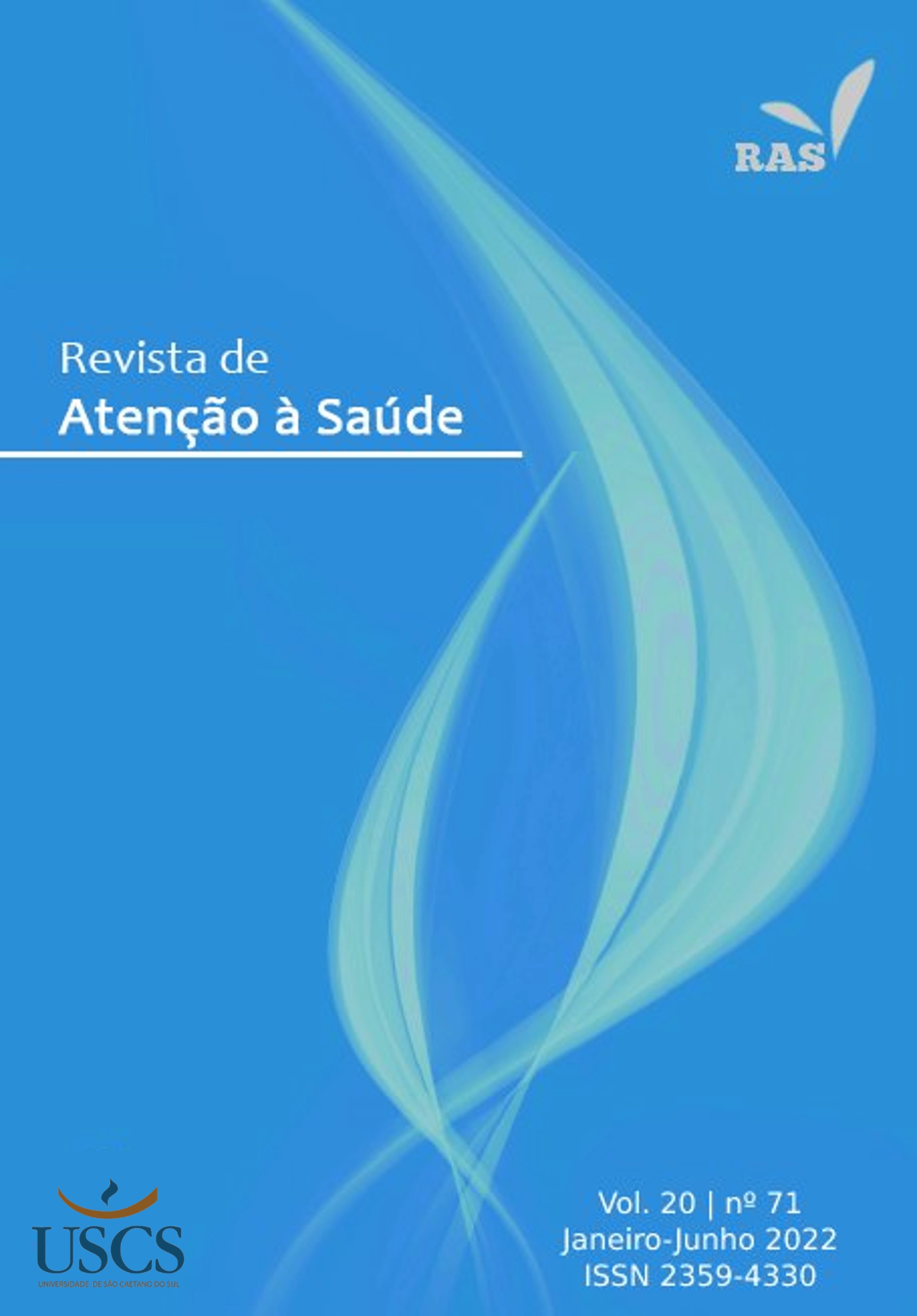Cuidados paliativos para o paciente oncológico: impacto psicológico no familiar cuidador Cuidados paliativos e o impacto psicológico no familiar
DOI:
https://doi.org/10.13037/2359-4330.8311Keywords:
Palliative Care. Cancer. Death. Family.Abstract
Palliative care is a distinctive approach, especially when indicated for oncological conditions when there is no possibility of disease remission. This treatment, when started early, aims to improve the quality of life of the patient by relieving pain and symptoms of the disease, also benefiting their families. The objective of this work was to investigate the psychological impacts on family members on the diagnosis and treatment in palliative care of cancer patients. This is a qualitative research with single case design, with a 50 year old participant, caregiver of her father, during palliative care in his home. The instrument used was two semi-structured interviews with supportive intervention if necessary. From the results analysis, it was observed that the participant decided to become a responsible caregiver for her father, showing intense emotional and physical impact and questioning about her faith, being necessary to adapt and resignifyher life before this experience. It was concluded that there was a psychological impact on the participant from the experience of changes caused by her father's illness and the adaptation to caring for him, with feelings of fear and anxiety at the expectation of death, and after the death, the interviewee showed affective ambivalence related to the loss and the need to readapt her routine, this being a gradual process of mourning.
Downloads
References
Instituto Nacional de Câncer. Como surge o câncer? Rio de Janeiro: Instituto nacional do Câncer; 2019. Disponível em: https://www.inca.gov.br/como-surge-o-cancer
Instituto Nacional de Câncer. O que é câncer? Rio de Janeiro: Instituto nacional do câncer; 2019. Disponível em: https://www.inca.gov.br/o-que-e-cancer
Instituto Nacional de Câncer. Tipos de câncer. Rio de Janeiro: Instituto nacional do câncer; 2019. Disponível em: https://www.inca.gov.br/tipos-de-cancer
Othero MB., Costa DG. Propostas desenvolvidas em cuidados paliativos em um hospital amparador. Terapia Ocupacional e Psicologia. Prat. Hosp 2007; 9(52): 157-60. Disponível em: https://paliativo.org.br/wp-content/uploads/downloadmanager- files/ph_terapiaocupacional_psicologia.pdf
Rocha R., Rocha E., Machado M., Souza A., Schuch F. Sobrecarga do cuidador de pacientes oncológicos em cuidados paliativos. Revista de Enfermagem UFPE 2020; 14:e244165:1-9. doi :https://doi.org/10.5205/1981-8963.2020.244165
Carvalho MM. Psico-oncologia: história, características e desafios. Psicologia USP 2002; 13(1): 151-166. doi: https://doi.org/10.1590/S010 3-65642002000100008.
Borges ADVS., Silva EFD., Mazer SM., Toniollo PB., Valle ERMD., Santos MAD. Percepção da morte pelo paciente oncológico ao longo do desenvolvimento. Psicologia em estudo 2006; 11(2): 361-369. doi: https://doi.org/10.1590/S1413- 73722006000200015.
Kovács MJ. Autonomia e o direito de morrer com dignidade. Revista Bioética 2009; 6(1): 1-8. Disponível em: https://revistabioetica.cfm.org.br/index.php/revista_bioetica/ article/view/326
Mello AGC, Figueiredo MTA. Cuidados Paliativos: Conceito básico, histórico e realização da Associação Brasileira de Cuidados Paliativos e da Associação Internacional de Hospice e Cuidados Paliativos: Cibele Pimenta, Diná Cruz. Org. Dor e cuidados paliativos: enfermagem, medicina e psicologia. Barueri, SP: Manole; 2006.
Bifulco VA., Caponeiro R. Cuidados paliativos: conversas sobre a vida e a morte na saúde. 2016. Barueri, SP: Editora Manole; 2016.
Kovács MJ. Desenvolvimento da Tanatologia: estudos sobre a morte e o morrer. Paidéia (Ribeirão Preto) 2008; 18 (41): 457-468. Disponível em: file:///C:/Users/vaio/Documents/TCC%20Atualizado/TCC%20minhas%20orienta%C3%A7%C3%B5es/326-1429-1-PB.pdf
Othero MB., Costa DG. Propostas desenvolvidas em cuidados paliativos em um hospital amparador. Terapia Ocupacional e Psicologia. Prat. Hosp 2007; 9(52): 157-60. Disponível em: https://paliativo.org.br/wp-content/uploads/downloadmanager- files/ph_terapiaocupacional_psicologia.pdf
Ferreira APQ., Lopes LQF., Melo MCB. O papel do psicólogo na equipe de cuidados paliativos junto ao paciente com câncer. Revista da SBPH 2011; 14(2): 85-98 Disponível em: http://pepsic.bvsalud.org/pdf/rsbph/v14n2/v14n2a07.pdf
Sanchez KDOL., Ferreira NMLA., Dupas G., Costa DB. Apoio social à família do paciente com câncer: identificando caminhos e direções. Revista Brasileira de Enfermagem 2010; 63(2): 290-299. doi: https://doi.org/10.1590/S0034-71672010000200019
Garcia SA., Corrêa MI., Sudário AMB., Barros ALD., Moura CCG., Araujo JG., Oliveira LP., Soares MM., Dias PAR., Pereira TC. Comprometimento da qualidade de vida dos cuidadores de pacientes em tratamento paliativo. Revista Eletrônica Acervo Científico 2021; 19:e6046: 1-7. doi: https://doi.org/10.25248/reac.e6046.2021
Ribeiro AF., Souza CA. O cuidador familiar de doentes com câncer. Arq Ciênc Saúde 2010; 17(1):22-6. Disponível em: https://repositorio- racs.famerp.br/racs_ol/vol-17-1/IDL3_jan-mar_2010.pdf
Ferreira NMLA., Souza CBS., Stuch Z. Cuidados paliativos e família. Rev. Ciênc. Méd. 2008; 17(1):33-42. Disponível em: http://periodicos.puc-campinas.edu.br/seer/index.php/cienciasmedicas/article/view/742
Dossena TD., Zacharias DG. Impacto do diagnóstico oncológico no meio familiar: O papel da psico-oncologia. Anais da Jornada de Psicologia UNISC; 2017. Disponível em:https://online.unisc.br/acadnet /anais/index.php/jornada_psicologia/article/view/17632
Carvalho RTD., Parsons HA. Manual de cuidados paliativos. São Paulo: Associação Nacional de Cuidados Paliativos (ANCP); 2012.
Freud S. Reflexões para os tempos de guerra e morte. Reflexões para os tempos de guerra e morte. Edição standard das obras completas. Rio de Janeiro: Imago, 14:285-310,;1915/1996.
Kubler Ross E. Sobre a morte e o morrer: o que os doentes têm para ensinar a médicos, enfermeiras, religiosos e aos seus próprios parentes. São Paulo: Editora Martins Fontes; 1926/1996.
Souza EEF., Nevesa LML., Gregório APA., Gouvêa MV. Comunicação de más notícias nos cuidados paliativos oncológicos: revisão integrativa. Diversitates Int J. 2018; 10(3): 35-47. Disponível em: http://www.diversitates.uff.br/index.php/1diversitates-uff1/article/view/282/151
Krom M. Família e Mitos: prevenção e terapia: resgatando histórias. São Paulo: Summus; 2000.
Cavalcanti AKS. Samczuk. ML., Bonfim TE. O conceito psicanalítico do luto: uma perspectiva a partir de Freud e Klein. Psicologo informação 2013; 17(17):87-105. Disponível em: http://pepsic.bvsalud.org/scielo.php?script=sci_arttex&pid=S14 15-88092013000200007&lng=pt&tlng=pt.
Worden JW. Terapia do Luto: um manual para profissionais da saúde. São Paulo: Artes Médicas; 1932/2013.
Shaughnessy JJ.; Zechmeister EB., Zechmeister JS. (2012) Metodologia de Pesquisa em Psicologia. Porto Alegre: AMGH; 2012.
Kovács MJ. Morte e desenvolvimento humano. Casa do Psicólogo, São Paulo: Casa do Psicólogo, 1992.
Muccillo NE.Cuidados Paliativos: Conceito básico, histórico e realização da Associação Brasileira de Cuidados Paliativos e da Associação Internacional de Hospice e Cuidados Paliativos. In: Cibele Pimenta, Diná Cruz. Dor e cuidados paliativos: enfermagem, medicina e psicologia. Barueri, SP: Manole; 2006.
Downloads
Published
Issue
Section
License
Copyright (c) 2022 Patricia Barreto da Silva, Mariana Fernandes dos Santos, Nirã dos Santos Valentim

This work is licensed under a Creative Commons Attribution-NonCommercial-NoDerivatives 4.0 International License.
Policy Proposal for Journals offering Free Delayed Access
Authors who publish in this magazine agree to the following terms:
- Authors maintain the copyright and grant the journal the right to the first publication, with the work simultaneously licensed under a Creative Commons Attribution License after publication, allowing the sharing of the work with recognition of the authorship of the work and initial publication in this journal.
- Authors are authorized to assume additional contracts separately, for non-exclusive distribution of the version of the work published in this magazine (eg, publishing in institutional repository or as a book chapter), with the acknowledgment of the authorship and initial publication in this journal.
- Authors are allowed and encouraged to publish and distribute their work online (eg in institutional repositories or on their personal page) at any point before or during the editorial process, as this can generate productive changes, as well as increase impact and citation of the published work (See The Effect of Open Access).









